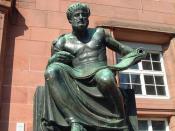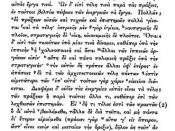As a Persian Proverb once said, "Doubt is the key to knowledge." Doubt is one of the factors that influence the expansion of knowledge. Any fact that is considered true beyond any suspicion had to be subject to at least one person's questioning, since "any belief worth having must survive doubt" (Anonymous). It is possible to follow a pattern in the growth of knowledge in many subjects such as the natural sciences, history, and human sciences; a significant boost in the accumulation of information occurred during the Classical and Post-Medieval times. Why is it that such a gap in the increase of knowledge occurred? During the Middle-Ages, the continent of Europe, which had flourished with discoveries earlier, fell under the influence of the Roman Catholic Church. Men with an everlasting thirst for power took control over thousands of people in different kingdoms under the Christian flag. In order to avoid riots and treason, the Church wouldn't allow people to have their own thoughts.
Anything or anyone that either questioned the bible or the Pope's authority would be in grave danger. By eliminating the right for people to have their doubts, the Church eliminated the chance for expansion and improvement of knowledge, as well.
During the Ancient times in Greece and later on in the rest of Europe after the Renaissance, there were several advances in the area of natural sciences. For example, Eratosthenes, an ancient Greek scientist, was the first to make an accurate prediction of the diameter of the Earth (Science). If Eratosthenes had no interesting in finding out what the Earth's diameter was or either proving or disproving a previous statement made on it, then he would've never contributed to this area of knowledge. Since this scientist lived in Ancient Greece, his curiosity and questions about the...



Hi!
Hi !
Ive got a question, are u delivering this for the IB Program??
Greetings
0 out of 0 people found this comment useful.